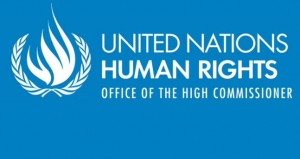 The Office of the UN High Commissioner for Human Rights (OHCHR) issued a new report titled “Discrimination and violence against individuals based on their sexual orientation and gender identity,” reports Saurav Jung Thapa on the HRC Blog.
The Office of the UN High Commissioner for Human Rights (OHCHR) issued a new report titled “Discrimination and violence against individuals based on their sexual orientation and gender identity,” reports Saurav Jung Thapa on the HRC Blog.
This report comes in the wake of recent United Nations initiatives to advance LGBT human rights, such as the UN Free & Equal campaign and the ‘Being LGBT in Asia’ initiative. In the last few years, top leaders of the UN, including Secretary-General Ban Ki-moon, have been ardent advocates of the need to protect and promote the rights of LGBT people. The new UN High Commissioner for Human Rights, and the first from an Arab country, Zeid Ra’ad Al Hussein, has also been a supporter of equality, saying that there can be no justification for discriminating against people on the basis of their sexual orientation.
The first time that a UN political body affirmed the equal human rights of LGBT people was in June 2011, when the UN Human Rights Council narrowly passed a resolution, sponsored by South Africa, that called for a study on discrimination and sexual orientation and gender identity.
Then in September 2014, the Council comfortably passed a similar but more expansive resolution calling for a report on violence and discrimination on the basis of sexual orientation and gender identity. Today’s report is a response to that resolution.
According to this report, LGBT people have made notable advances since 2011. 12 more countries have introduced marriage or civil unions for same-sex couples (taking the total to 34 countries) and 10 more countries have made it easier for transgender people to obtain accurate legal documents. However, these advances have been overshadowed by continuing violence and impunity, criminalization and discrimination in a variety of settings such as legal frameworks, healthcare, housing and education.
In many countries, LGBT people suffer under discriminatory and punitive laws. The report unequivocally notes that “States that criminalize consensual homosexual acts are in breach of international human rights laws…” Discrimination against LGBT people in many countries is exacerbated by other factors such as race, gender and poverty. The report notes that “All human beings, irrespective of their sexual orientation and gender identity, are entitled to enjoy the protection of international human rights law…” and states have an obligation to protect their LGBT citizens from violence.
Violence against LGBT people is often characterized by a degree of cruelty exceeding that of other hate crimes. The report notes the “alarmingly high rates of homicidal violence” against LGBT people and highlights the additional risk faced by lesbians and transgender women because of gender inequality.
The report also expresses concern about the inflammatory and hateful rhetoric deployed against LGBT people in The Gambia, Honduras, and Belarus. It notes that “anti-propaganda” laws, such as in Russia, which many Central Asian states are considering copying, fuel persecution of LGBT people.
According to the report, more than 76 countries have laws that criminalize and/or persecute LGBT people. Eight countries prescribe the death penalty for homosexual conduct, including Saudi Arabia, Brunei, and parts of Nigeria.
Bullying and physical abuse against youth and students perceived to be LGBT is rampant along with harassment and abuse at the workplace. LGBT youth suffer from disproportionately high rates of homelessness. There is mounting concern over the unscientific and unethical practice of “conversion therapy” which is sometimes tantamount to torture.
The UN report provides detailed and actionable recommendations for governments. These include legal recognition of same-sex couples and their children; repealing laws that penalize consensual same-sex conduct; repealing “anti-propaganda” laws; enacting comprehensive anti-discrimination legislation; permitting freedom of assembly and speech for LGBT activists; proscribing hate crimes and incitement to violence; ending abusive and dangerous “conversion therapy” practices; and providing identity documents that reflect self-identified gender for transgender citizens.











